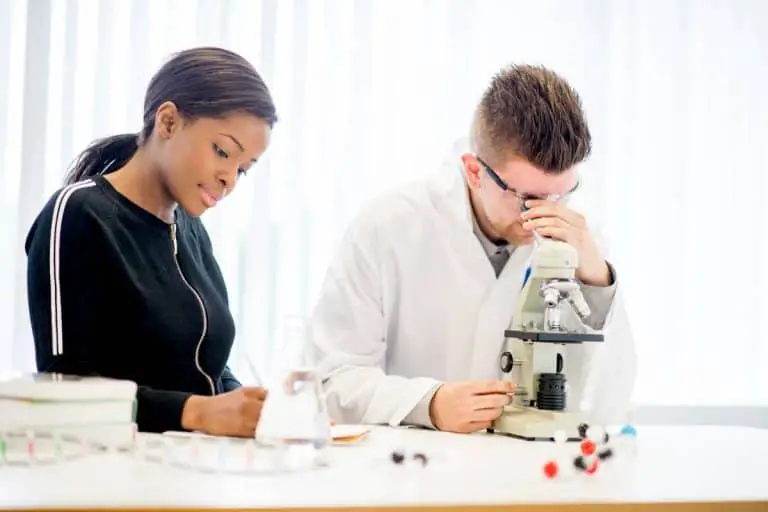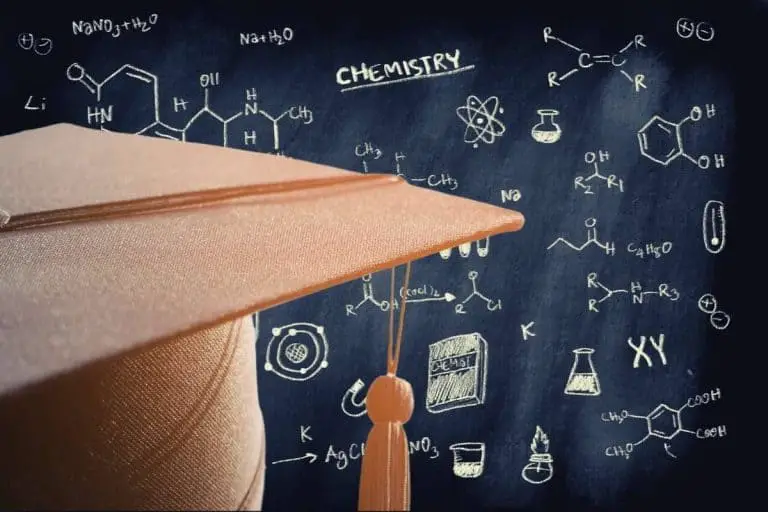Does Chemistry Involve Math? Here Are the Facts
For many students, math can be a significant obstacle in their studies. This can feel especially frustrating to those who want to take up a scientific degree. However, not all sciences use math to the same degree of complexity, and chemistry can be said to be on the lower end.
Chemistry involves math to analyze molecules and chemical reactions. Unless you specialize in math-heavy branches, you’ll mostly use basic algebra, calculus, and geometry throughout your chemistry undergraduate degree.
This article aims to resolve any doubts about the role of math in chemistry, including what kind of math it uses, how much math it involves, and how hard it is. As you’ll see, having difficulties with math doesn’t mean you can’t study chemistry.
What Kind of Math Is Used in Chemistry?
In chemistry, math is constantly used as a versatile tool. The math you’ll find in chemistry courses is geared towards solving chemical issues and not that centered on the math itself.
The kind of math most used in chemistry includes algebra, graphing, geometry, ratio, calculus, and probability. They’re used to balance chemical reactions, measure molecules, and visualize molecular structures, among other things.
You’ll have to transfer the math in chemistry into real-world contexts. Instead of just following a recipe, a chemistry student will always face small variations in mathematical formulas.
Chemistry studies the interactions between molecules. We can distinguish one from the other because they are made up of different elements among the 92 that we know of, and math provides a way to measure and describe those elements.
Some of the purposes that chemists give to mathematics include:
- Measuring molecules: To understand molecules, chemists must measure the electrons, protons, and neutrons that make up their atoms. Math can measure the charges and the number of particles in an atom, which lets chemists understand how they interact with one another.
- Visualizing: Chemistry constantly uses mathematical tools to visualize molecules and their interactions. Mostly, these are molecular diagrams and structural formulas.
- Balancing: Treating chemical reactions like differential equations allows chemists to predict their results and know when molecules can’t combine. Linear algebra and integers give insights into a chemical reaction.
- Graph theory: Molecules can have the same elements in the same distribution and still be different. Chemists use special kinds of graphs that describe how elements connect to one another in different ways.
Several different types of mathematics are associated with chemistry. Let’s take a look at them now.
Source: American Mathematical Society
Algebra
Algebra is perhaps the most frequently used type of math in chemistry.
Balancing chemical equations is what allows chemists to predict interactions between different elements. These equations are an application of the differential equations found in algebra.
Other than balancing, differential equations are also used to determine variables. For example, you might have to resolve the density equation to determine some other variable on the equation.
Chemists are always working with measurements, and thus conversion factors become another crucial part of algebra in chemistry. This involves converting one unit of measurement into another, like hours to seconds or centimeters to meters.
However, this can get more complex in the context of chemistry.
In chemistry, you’ll have to go one step further with your measurements and apply dimensional analysis. In dimensional analysis, you don’t just consider the different units in questions, but also what units you want to end up with and how to get them with conversion factors.
Source: Ck-12
Ratio
Ratios play an important role in measuring substances in chemistry. They’re taught in elementary school, but many people carry misconceptions about it.
Ratios compare values.
Specifically, they tell you how much of one unit can be contained in another. For example, if you make a mix of 1 cup (150 g) of flour and ½ cup (68 g) of sugar, then you’ll have a ratio of 1:2. Of course, this can get tricky when you apply it to chemistry.
Ratios in chemistry are mainly used to determine the different proportions of moles in the substances of a chemical reaction. They allow predicting exactly how much of a certain product can be obtained from it.
Ratios are also used in balanced equations to determine the amounts of their materials.
Graphing
Chemists, like any other scientists, look for patterns in their research. Mathematics offers a useful tool for this purpose: graphing.
A graph is a visual representation of data in a coordinate system. Chemists use them to compare how different substances change during a chemical reaction.
Graphs allow you to plot these changes in a single place, using lines and coordinates. Converting raw numbers into an image makes the information easier to grasp and allows chemists to create further insights.
Calculus
Much of the time, you won’t need to use calculus, but it’s heavily used in areas of chemistry like thermodynamics, kinetics, physical chemistry, and quantum chemistry.
Chemists use calculus to predict the rates of reactions. It’s also necessary for finding relations between several values of a given substance, such as the relation between the density of a liquid and its temperature and pressure.
Overall, calculus won’t be a huge part of your undergraduate chemistry degree. But, you’ll have several classes within this branch if you specialize in a calculus-heavy area like physical chemistry.
Geometry and Trigonometry
If you stop to think about it, it’s easy to see why there’s geometry.
The molecules that chemistry studies are 3D objects in space with real shapes and sizes. Geometry is used to analyze the structures that molecules form, as well as the properties of atoms.
For one, geometry is necessary if you want to make a visual representation of molecules on paper, as it allows you to see the arrangements of atoms that create the molecule. Chemists also use geometry to calculate the shape of molecules, just as you would calculate the shape of a sphere.
Trigonometry, which is a subset of geometry, is used in chemistry to study molecular structures. Molecules combine to form structures, and the shape and size of those structures give us different types of materials.
Chemists use trigonometry to study the qualities of molecular structures. After all, they are made of specific angles and distances between molecules, which is what trigonometry is all about.
You’ll be using geometry and trigonometry constantly but won’t need a deep understanding of them except in specific cases.
Probability
Subatomic particles don’t behave as normal objects, so you can’t determine their exact position without also affecting it. So, when scientists want to figure out their position in space, they assign probabilities to the different places particles could be.
What distinguishes an element from another is the number and placement of its atoms. For this reason, probability becomes extremely valuable in chemistry.
It allows chemists to understand exactly how atoms molecules are constituted.
What Percentage of Chemistry Is Math?
This question is a little hard to answer since mathematical operations are used constantly in chemistry. Every time you graph a molecule, you’re using a mathematical tool. When you balance a chemical reaction, even if it’s an extremely simple one, you’re using math.
Twenty percent of Chemistry involves math evaluations. All chemistry uses math, but it usually isn’t complex. Only specific areas and tasks require heavy use of math.
So, as much as you’ll be exposed to math in chemistry, you’ll mostly apply it directly to solving specific problems regarding molecules or chemical reactions. There’ll be few instances of pure mathematics.
Source: AQA
Is the Math in Chemistry Hard?
The math used in general chemistry isn’t difficult. This is not to say that you can forget about it, as you’ll use it constantly, so you should be comfortable with it. However, you won’t be required to reach an advanced level of mathematics in most of chemistry.
The math used in general chemistry isn’t that hard. Still, fundamentals like algebra, statistics, and geometry are necessary to understand undergraduate chemistry. Complex math is used in more advanced courses and certain areas like physical chemistry.
The difficulty of math also varies tremendously depending on the branch of chemistry that you’re in. For example, organic chemistry uses relatively little math and is much more reliant on qualitative analysis.
Meanwhile, physical chemistry uses advanced calculus.
Although the math in chemistry isn’t especially hard, it can still pose some unique challenges. Even students with a great math record might encounter difficulties. These are some of the reasons students struggle with math in chemistry:
- Being accustomed to following a formula. Math is often taught as a process that must be followed correctly, no matter what. In chemistry, however, small changes can cause deviations from the formula, which can catch some students off guard.
- Taking math to real-world cases. Chemistry deals with real objects. Meanwhile, pure math is completely abstract. Because many students understand math in an abstract way only, they may struggle with using it in concrete situations.
- Solving problems that aren’t obvious. Often, the problems in chemistry don’t have an obvious way of being solved. Students may have to determine their own mathematical steps to solve them.
(See Trigonometry vs. Calculus: Differences and Difficulty of Each)
I’m Bad at Math. Do I Have a Chance in Chemistry?
If you’re bad at math, you can still study chemistry as long as you make an effort to grasp the fundamentals. Chemistry doesn’t delve as deep into pure mathematics as other sciences do. Being good at math will certainly make your life as a chemistry student easier.
Moreover, if you find it hard to grasp the basics of math, you’ll hit a wall when trying to understand much of chemistry.
However, being a good chemistry student involves more than just math.
Excelling at calculus and algebra won’t be enough to understand some of the more complicated parts of chemistry, like equilibrium or spectroscopy. Even math-heavy concepts in chemistry require visualizing skills.
But don’t think you can brush off the problem.
If you’re starting as an undergraduate and struggle with basic math, you’ll be able to catch up if you put in enough effort. But as you advance through chemistry, you’ll find more and more complicated equations.
Make sure you keep improving your math throughout your career. Otherwise, more complex elements of math like advanced probabilities and dimensions won’t get you by surprise later in your career.
Source: Mathematical Association of America
How To Improve Your Math Skills
If you’re unsure about which math skills you should be good at, aim at grasping these elements of math as soon as you can:
- Unit conversions
- Basic statistics
- Basic algebra and trigonometry
- Significant figures
- Summation notation
- Proportions and concentrations
It can be a good idea to take a refresher course on math. You can go to the math department to look for one. The only downside is that these courses tend to focus on mathematics itself, without much info on its applications.
A class on math methods can be a great choice. There you won’t just refresh your math, but you’ll also learn the methods that’ll help you get the most out of the instruments of chemistry.
However, it’s rare to find a class on math methods specially designed for chemists outside of the math in a chemistry program. If there isn’t a suitable class in your college and you don’t quite grasp basic algebra, then try getting a tutor as soon as possible to get up to speed.
Source: Chemical and Engineering News
You could get passing grades during most of your undergraduate years with only basic algebra and calculus. However, besides proving a problem if you want to further your education, you’ll also be missing out on much of what chemistry has to offer.
Conclusion
Math is a tool for understanding chemical processes. If you hone your math skills, chemistry could suddenly become much for fascinating than it already is.
Math in chemistry isn’t particularly difficult, at least in comparison with other sciences. However, you’ll use it constantly, so you should feel confident about math fundamentals like algebra, ratio, graphing, calculus, and geometry.
If your math level isn’t great and you’re about to start studying chemistry, you still have a chance to catch up if you put in enough effort. You can try getting provisional courses or getting a tutor.
Recommended Reading:







